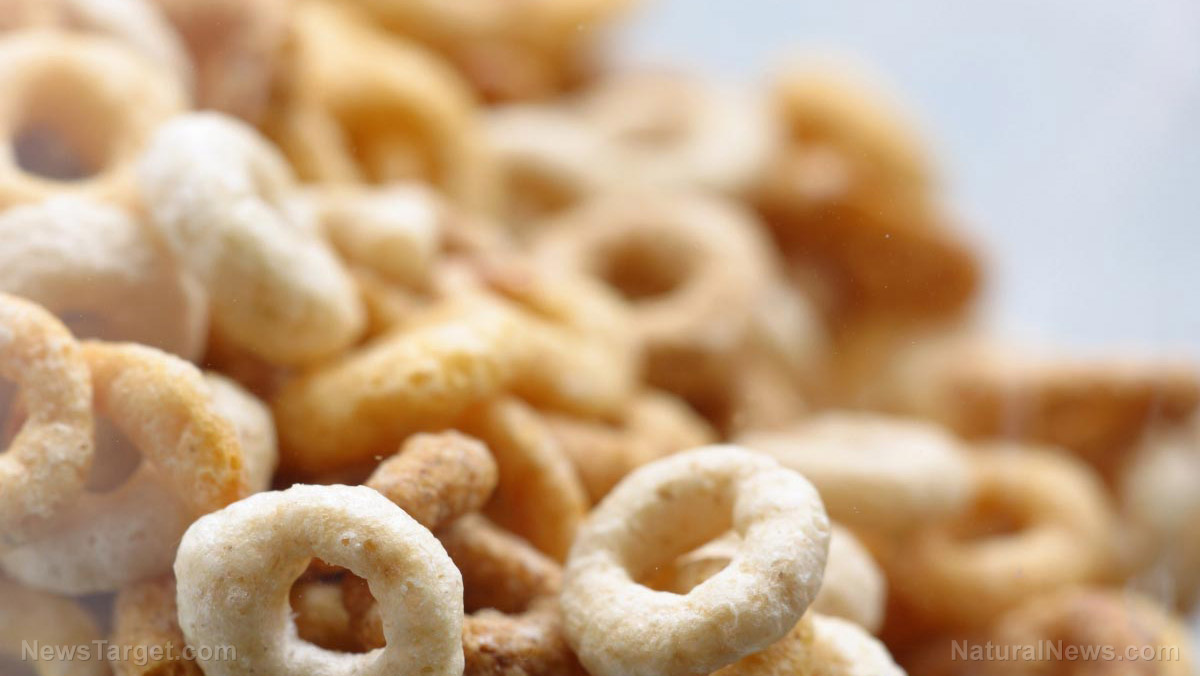Would you feed your kids cancer-causing breakfast foods? Tests reveal many cereals contain the weed killer glyphosate
04/08/2019 / By Cassie B.

Although many people tend to worry about pesticides mostly when they’re eating fruit and vegetables, the use of weedkillers like glyphosate is so widespread that it’s popping up everywhere. One place you might not expect to find it is in your breakfast cereal, but tests show that the chemical has even made its way into some of the most popular cereal brands.
Tests carried out by the Environmental Working Group (EWG) found glyphosate in every sample they tested of popular oat-based cereals and other foods marketed to children – and the levels aren’t insignificant. Nearly all of them had glyphosate residue levels that exceeded the amounts that EWG scientists believe are protective of children’s health, 160 parts per billion.
In fact, some cereals have more glyphosate than vitamins. Childhood staple Honey Nut Cheerios, for example, contains more glyphosate than Vitamins B12 and D, while Quaker Oatmeal Squares contain more glyphosate than Vitamin A.
In tests of food purchased at Washington, D.C. and San Francisco Bay area grocery stores, Quaker Oatmeal Squares breakfast cereal performed the worst, with levels of glyphosate at 2,837 ppb, or 18 times higher than the EWG benchmark. Their benchmark is stricter than that of government regulators as it takes into account the risks of exposure over a lifetime, as many people consume foods like cereal on a daily basis.
Other products on the list include Apple Cinnamon Cheerios, Quaker Breakfast Squares Soft Baked Bars Peanut Butter, Quaker Overnight Oats Raisin Walnut & Honey Heaven, and Quaker Oatmeal Squares Brown Sugar.

The results show that nothing has improved since their previous round of testing, in which all but two samples of 45 foods made with conventional oats and a third of products made with organic oats were found to contain glyphosate. Oats are regularly sprayed with glyphosate to dry them out prior to harvest, while crops like soybeans and corn are regularly grown using the toxic chemical.
EWG President Ken Cook wondered just how many bowls of oatmeal and cereal with glyphosate kids have already consumed, adding: “But if those companies would just switch to oats that aren’t sprayed with glyphosate, parents wouldn’t have to wonder if their kids’ breakfasts contained a chemical linked to cancer. Glyphosate and other cancer-causing chemicals simply don’t belong in children’s food, period.”
Meanwhile, tests from the Center for Environmental Health have also found glyphosate in children’s foods like Gerber Single Grain Oatmeal for babies, Great Value O’s Oat Cereal, Quaker Life Original Multigrain Cereal, and Signature Kitchens Honey Nut Toasted Oats.
Glyphosate linked to cancer, thousands of lawsuits pending
Glyphosate is considered a probable carcinogen by the World Health Organization’s International Agency for Research on Cancer, and the chemical is believed to be responsible for causing cancer in countless people. In fact, the manufacturer of top glyphosate weedkiller Roundup, Monsanto, is facing thousands of lawsuits from cancer victims. They were recently ordered to pay $80 million to a California man after a federal jury found that it caused his cancer; a similar case saw a former school groundskeeper awarded $289 million in compensatory and punitive damages, which was later reduced to $78 million on appeal.
While it’s horrible that so many adults have developed cancer from exposure to this product, it’s even more concerning to think about what could happen to children. Thankfully, most kids aren’t outside spraying the product across their lawn, but what could happen to them when they’re older if they eat small amounts of it every day? A child’s body is still developing and therefore more sensitive to exposure than adults are, and they also take in more of the toxic chemicals than adults do relative to their size.
It’s absolutely unforgivable that products marketed toward children contain toxic chemicals like glyphosate, and this could be one of the strongest arguments yet in favor of growing and making your own food.
Sources for this article include:
Submit a correction >>
Tagged Under:
breakfast, cereal, child health, food safety, food testing, glyphosate, grocery, oatmeal, oats, poison, Roundup, toxic ingredients, toxins, weed killer
This article may contain statements that reflect the opinion of the author




















